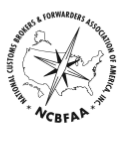
A
A.T.: American Terms (Marine Insurance) A term used to differentiate between the conditions of American Policies from those of other nations, principally England.
ABCC: Association of British Chambers of Commerce
ABI - Automated Brokerage Interface: Is a system available to U.S. Customs Brokers with the computer capabilities and customs certification to transmit and exchange customs entries and other information, facilitating prompt release of imported cargo.
ABI: Association of British Insurers
Acceptance: A time draft (or bill of exchange) which the drawee has accepted and is unconditionally obligated to pay at maturity. Drawee's act in receiving a draft and thus entering into the obligation to pay its value at maturity. An agreement to purchase goods under specified terms.
Ad Valorem ("according to the value"): A fixed percentage of the value of goods that is used to calculate customs duties and taxes.
Add Hoc Charter: A one-off charter operated at the necessity of an airline or charterer.
Admirality Court: Is a court having jurisdiction over maritime questions pertaining to ocean transport, including contracts, charters, collisions, and cargo damages.
Advance Against Documents: Load made on the security of the documents covering the shipment.
Advising Bank: A bank that receives a letter of credit from an issuing bank, verifies its authenticity, and forwards the original letter of credit to the exporter without obligation to pay.
Advisory Capacity: A term indicating that a shipper's agent or representative is not empowered to make definite decisions or adjustment without the approval of the group or individual represented.
AF: Advance freight (i.e. prior to shipment)
Affiliate: Is a company that controls, or is controlled by another company, or is one of two or more commonly controlled companies.
Affreightment: The hiring of a ship in whole or in part
AFT: At or towards the stern or rear of a ship
Agency Agreement: The steamship line appoints the steamship agent and defines the specific duties and areas of responsibility of that agent.
Air Cargo Agent: Is a type of freight forwarder who specializes in air cargo and acts for airlines that pay him a fee (usually 5%). He is registered with the International Air Transport Association, IATA (See also Air Freight Forwarder; Forwarder, Freight Forwarder, Foreign Freight Forwarder).
Air Freight Forwarder: Is a type of freight forwarder who specializes in air cargo. He usually consolidates the air shipments of various exporters, charging them for actual weight and deriving his profit by paying the airline the lower consolidated rate. He issues his own air waybills to the exporters, is licensed by the CAB (Civil Aeronautics Board) and has the status of an indirect air carrier (See also Air Cargo Agent, Forwarder, Freight Forwarder, Foreign Freight Forwarder.)
Air Waybill: A bill of landing that covers both international and domestic flights transporting goods to a specified destination. This is a non-negotiable documents of air transport that serves as a receipt for the shipper, indicating that the carrier has accepted the goods listed and obligates itself to carry the consignment to the airport of destination according to specified conditions.
Airfreightment: An agreement by a steamship line to provide cargo space on a vessel at a specified time and for a specified price to accommodate an exporter or importer, who then becomes liable for payment even though he is later unable to make the shipment.
AITA: International Air Transport Association, IATA, (French, German).
All Risk Insurance: Is a clause included in marine insurance policies to cover loss and damage from external causes, such as fire, collision, pilferage, etc. but not against innate flaws in the goods, such as decay, germination, nor against faulty packaging, improper packing/ loading or loss of market, nor against war, strikes, riots and civil commotions (See Marine Insurance)
All-Risk Clause: Is an insurance provision that all loss or damage to goods is insured except that of inherent vice (self caused). (See All Risk Insurance).
Alongside: A phrase referring to the side of a ship. Goods to be delivered "alongside" are to be placed on the dock or barge within reach of the transport ship's tackle so that they can be loaded abroad the ship.
AN: Advice note
ANF: Arrival notification form
AP: Additional premium
Arbitration Clause: Is a standard clause to be included in the contracts of exporters and importers, as suggested by the American Arbitration Association. It states that any controversy or claim will be settled by arbitration in accordance with the rules of the American Arbitration Association.
Assignment of Proceeds: A stipulation within a letter of credit in which some or all of the proceeds are assigned from the original beneficiary to one or more additional beneficiaries.
Assignment: The transfer of the rights, duties, responsibilities and/or benefits of an agreement, contract, or financial instrument to third party.
ATP: Accorde Transports Perissable, (European Agreement on the International Carriage of Perishable Foodstuffs)
Automated Brokerage Interface (ABI): An electronic system allowing customhouse brokers and importers to interface via computer with the US Customs Service for transmitting entry and entry summary data on imported merchandise.
Automated Commercial System (ACS): The electronic system of the US Customs Service, encompassing a variety of industry sectors, that permits on-line access to information in selected areas.
Automated Manifest System (AMS): The electronic system allowing a manifest inventory to be transmitted to the US Customs Service data center by carrier, port authority or service center computers.























